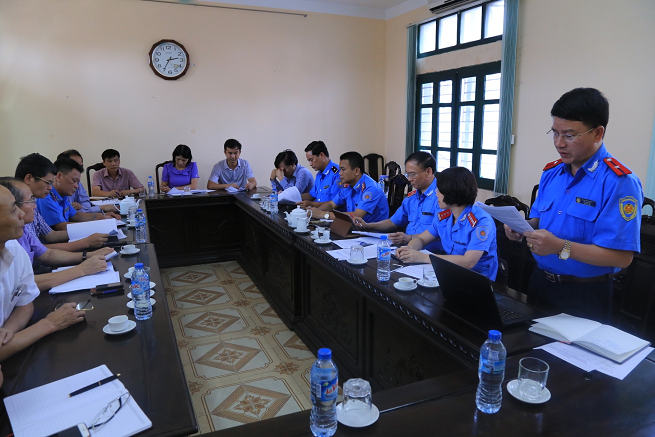The Law on Public Employees issued by the National Assembly of Vietnam on November 15, 2010, and effective from January 1, 2012, marks an important milestone signifying a new trend in the legal regulation of public employees within public service providers - performing public services, significantly impacting 1.6 million workers (of which up to 80% are public education employees) currently working in nearly 52,000 public service providers. One of the topics within the Law on Public Employees that has garnered considerable attention from academia is the issue of employment contracts for public employees.
The working contract in Vietnam is a type of legal contract, signed between a public employee and a public service provider. However, the essence of this contract and how it differs from labor contracts signed between a employee and an employer in enterprises is subject to thorough analysis. This is both a theoretical-legal and practical matter that must be discussed accurately to perfect the laws regarding working contracts of public employees in public service providers and to ensure the legitimate rights and interests of public employees.
1. Notion of the Working Contract in Vietnam
The term "working contract" (WCC) was first used in Decree No. 116/2003/ND-CP dated October 10, 2003, of the Government of Vietnam, concerning recruitment, usage, and management of officials in public service providers. Amended by Decree No. 121/2006/ND-CP dated October 23, 2006 (Decree No. 116), this marked a trend in legal adjustments for state public employees and opened a new direction for the activities of officials in public service providers and officials in state agencies.
Clause 7 of Article 3 of Decree No. 116/2003/ND-CP states: "A working contract is a recruitment form for people to work in state public service providers, based on a written agreement between the unit authorized to recruit and the recruited person.” With this understanding, it introduces a new contract policy trend replacing the longstanding staffing policies in state public service providers. The working contract is used to substitute administrative decisions - accepting someone recruited to work in state public service providers. The contract is a legal document detailing the agreement between a public service provider and the recruited individual. This creates a relationship with equal rights and obligations for both parties involved, fosters proactivity and autonomy of the public service provider, and especially gives the recruited person more flexibility. Recruited individuals can change their jobs more easily, and public employees can terminate the contract at their initiative to seek better-paying jobs with better working conditions. However, it should be noted that Decree No. 116 only applies to public employees, who were then still referred to as officials in state public service providers.
When the Law on Public Employees 2010 emerged, it separated the concept of "public employee" from "officials." The WCC was established as a specific regime in this law, marking a progressive step in the legal adjustments covering the implementation of public services by public employees in public service providers (state, political, and socio-political public service providers). The WCC of public employees is regulated from Article 25 to Article 30 in the Law on Public Employees and is specified further in Decree No. 29/2012/ND-CP dated April 12, 2012, of the Government of Vietnam on recruitment, usage, and management of public employees (Decree No. 29) and Circular No. 15/2012/TT-BNV dated December 25, 2012, of the Ministry of Home Affairs guiding recruitment, signing working contracts, and compensating for training and fostering costs for public employees. According to Clause 5, Article 3 of the Law on Public Employees: “A working contract is a written agreement between a public employee or a recruited individual as a public employee and the head of a public service provider regarding the job position, salary, remuneration policies, working conditions, and the rights and obligations of each party.”
Thus, a working contract is a legal document determining the rights and obligations of public employees and the public service providers using and managing them. It is also the fundamental basis for resolving disputes that arise between public employees and public service providers using and managing public employees.
2. Distinguishing the Working Contract from the Labor Contract in Vietnam
From the legal perspective, the working contract of a public employee and the labor contract (LC) both fall under specific legal regulations, though they have different legal bases (Law on Public Employees and the Labor Code). These two types of contracts share similarities and differences; both are negotiated agreements in labor or service relations, serving as bases for the rights and obligations of the parties involved and are enforced through various organizational and legal measures. However, the WCC has distinctive features compared to the LC, as illustrated in the points below:
a. Regarding the contract subjects: As defined above, a WCC is signed between a public employee or a recruited individual as a public employee and the head of a public service provider. Public employees include individuals working in public service providers, regarded as public employees, and those recruited and becoming public employees, who are “Vietnamese citizens recruited according to job positions, working in public service providers under the WCC policies, receiving salaries from the provider’s salary fund as per the law” (Article 2, Law on Public Employees). In contrast, one party of an LC is a employee, defined as “a person aged 15 or older, capable of working, working under a labor contract, paid a salary, and subject to the employer's management and administration” (Clause 1, Article 3 of the Labor Code 2012). Thus, under current legal stipulations, the subjects of a WCC are more narrowly defined and entirely different from those of an LC. In practice, public service providers may also include employees contracted under the Labor Code, such as janitors or drivers.
b. Regarding content: Due to differences in contracting and executing subjects, the content of the WCC differs from that of the LC. The WCC content includes agreements on job positions (work or tasks associated with professional titles or corresponding management positions), salary, remuneration policies, working conditions, and rights and obligations of each party (Clause 5, Article 3 of the Law on Public Employees). The LC entails agreements on paid employment, working conditions, and the rights and obligations of employees and employers (Article 15, Labor Code 2012).
c. In terms of form: The WCC must be presented solely in written form (Clause 2, Article 26 of the Law on Public Employees), while the LC may be documented in various forms - written or verbal (Article 16, Labor Code 2012).
d. Unilateral termination: For the WCC, there are no stipulated responsibilities for heads of public service providers or managing agencies when the WCC is unlawfully unilaterally terminated. Besides, no regulations cover the obligations of public employees upon the unlawful unilateral termination of the WCC. This remains a legal gap. By contrast, the LC provides detailed employer obligations upon unlawful unilateral termination (Article 42, Labor Code 2012), alongside stipulations on employee obligations under similar circumstances (Article 43, Labor Code 2012).
e. Contract invalidity: There are no existing regulations for WCC invalidity, whereas LC invalidity is covered under Section 4, Chapter III of the Labor Code 2012 (Articles 50-52), including cases of invalid LCs, the authority to declare LC invalidity, and handling invalid LCs.
3. Some Inherent Issues in Regulations on Working Contracts in Vietnam
Firstly, the working contract lacks distinct clarity and equality, failing to completely reflect the free will of contracting parties.
The most crucial principle of the WCC is not distinctly expressed, failing to wholly manifest the central principle of all types of contracts - equality and free will between contracting parties:
The WCC is signed between the head of a public service provider and a recruited individual “based on recruitment results” (Clause 2, Article 24, Law on Public Employees). Thus, the WCC falls within the scope of “public employee recruitment” (through exams or evaluations). Although the head of the public service provider is granted autonomy in recruiting, managing, and employing public employees, they must adhere to signing the WCC post-recruitment results. Even for qualified, capable individuals merely needing an interview to assess suitability, or for distinguished individuals, heads of public service providers cannot freely sign the WCC as employers in labor contracts can. The WCC regime for public employees has not sufficiently replaced previous recruitment policies for public employees.
In some cases, signing the WCC between the head of a public service provider and a public employee faces specific constraints, requiring consent from the competent authority. Clause 3, Article 26 of the Law on Public Employees states: “For professional titles as regulated, appointments must be approved by higher authorities of the public service provider before signing the working contract.” Clearly, signing and executing such WCCs in these instances do not align with the true spirit of “free contractual agreement,” equality, and free will between parties. The head of the public service provider, despite being vested with self-governance, must still be subject to the supervisory body of the public service provider during recruitment and WCC execution.
When the WCC is mutually agreed upon and signed, it binds the contracting subjects, stipulating their rights and obligations. However, the Law on Public Employees and guiding documents prescribe numerous obligations of public employees (general obligations, career activity obligations, obligations to public service units) (Articles 16, 17, 18, Law on Public Employees). Consequently, these statutory obligations impose numerous constraints and responsibilities on public employees, disallowing them to freely negotiate with the head of the public service provider, unlike employees in labor law relations who can freely express their will, negotiate, and implement the contract.
Although the WCC bears fundamental characteristics and diverges from the LC, its regulations in the Law on Public Employees and Decree No. 29 largely mimic many provisions of the Labor Code. Neither the Law on Public Employees nor Decree No. 29 differentiates clearly and logically between these two contracts. The WCC has not distinctly exhibited the unique aspects pertinent to its contracting subject, the public employee - the public service performer, in contrast to employees in labor contracts. Many Labor Code provisions, like the suspension or termination of the WCC and handling disputes, refer back to labor law (Clause 3, Article 28, Article 30, Law on Public Employees).
Secondly, regarding types of working contracts.
According to the Law on Public Employees 2010, there are two types of WCCs: fixed-term WCCs and indefinite-term WCCs (Article 25).
As per the Law on Public Employees, recruits must undertake a probationary policy (from 3 months to 12 months) and sign a fixed-term WCC (ranging from 12 months to 36 months). This probation period must be stated in the fixed-term WCC. The indefinite-term WCC applies to those who have completed the fixed-term WCC. Therefore, recruits who only undergo probation from 3 to 9 months must have a fixed-term WCC, and the contract duration is at least 12 months. However, if the recruit fails to complete the probationary period, the law lacks guidance on resolving this case. Article 29 of the Law on Public Employees on unilateral termination does not mention this scenario for unqualified probationers.
Decree No. 29 stipulates that if a probationer fails to meet requirements after probation, they will be subject to Clause 1, Article 24 of the Decree, i.e., “the probationer is terminated if they fail to meet the requirements post-probation.” Nevertheless, to terminate the WCC in this case, the head of the public service provider cannot unilaterally terminate the WCC with the public employee, as the Law does not list this as a ground for unilateral termination; and the legal effect of a decree cannot surpass or contradict the Law. Thus, the provider must still honor the 12-month fixed-term WCC with the recruited individual until expiration before termination, even if the probation wasn’t successful. This is clearly unpractical.
It’s worth noting that restricting WCC types to only fixed-term and indefinite-term fails to cover all real-world cases. Therefore, expanding WCC types (as previously acknowledged in Decree No. 116) to adjust for such scenarios is advisable. This ensures continuity of appropriate legal provisions and maintains regulatory comprehensiveness and efficacy.
Thirdly, regarding signing service contracts with retired public employees.
Clause 3, Article 46 of the Law on Public Employees provides: “Public service units can contract with pensioners if needed, and the pensioners are willing; during the contract period, apart from remuneration under the contract, they are entitled to specific policies and management mechanisms to ensure professional activities as regulated by the Government of Vietnam” (Clause 3, Article 46). Contracting with retired public employees might not ensure job stability, satisfaction, or official work recognition for public employees. Public employees are engaged in specialized activities providing public services through their expertise, differently from officials who mainly execute state power-related tasks or from employees in enterprises generating material values for society. For high-level public employees like professors, associate professors, PhDs in science, education, healthcare, it is rational to apply extended working policies or raise retirement ages to prevent wasting intellectual and experienced resources while maintaining professional stability and motivation.
Addressing this limitation, to implement the Law on Higher Education, the Government of Vietnam issued Decree No. 141/2013/CP on October 24, 2013, detailing and guiding several Law on Higher Education provisions. It allows professors, associate professors, and doctoral instructors at higher education institutions to extend their work post-retirement (up to 5 years for PhDs, 7 years for associate professors, and 10 years for professors), ensuring continuity in teaching.
In conclusion, regulations on WCCs in the Law on Public Employees 2010 and its guiding documents mark a progressive legal development for public employees. These regulations are more comprehensive, detailed, transparent, and innovative than previous ones. The WCC policy for public employees in public service providers promotes dynamism and autonomy of these providers, aligning with private investment trends in public services, optimal for public needs. However, some limitations in WCC regulations demand more profound insights into public employees' societal roles and professional nature to continue researching, amending, and supplementing legal provisions appropriately.
Nguyen Thi Thu Huong, MA - Democracy and Law Journal
- Key word:
- public employee
- Vietnam
- employment contract
 Article table of contents
Article table of contents
![[InfoGraphic] 6 forms of discipline for officials and public employees under Decree 71/2016/ND-CP](https://cdn.lawnet.vn//uploads/NewsThumbnail/2016/07/12/1319291-01.png)









.Medium.png)
.Medium.png)
.Medium.png)
.Medium.png)
